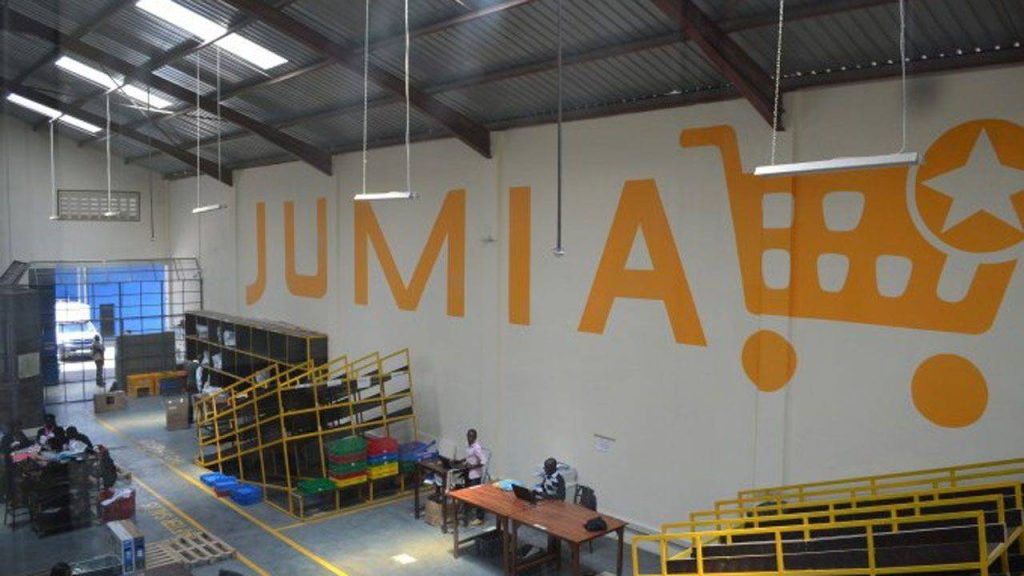Confused African Identity, Billion-Dollar Valuation – Tracing The ‘Unstarry’ Path Treaded By JUMIA

After months of speculation and hushed conversations, it looks like the much-talked-about Jumia Initial Public Offering (IPO) is finally happening.
Sipping The Jumia Juice!
Following in the footsteps of a number of other Rocket Internet-backed companies that have successfully gone public in the last two years – including furniture retailer, Home24, and food startups; Hello Fresh and Delivery Hero, who have are all currently listed on the Frankfurt Stock Exchange – an IPO is imminent for the pan-African e-commerce leader as confirmed reports have it that a listing on the New York Stock Exchange (NYSE) will happen in the next couple of weeks.
Well, pending some setback of epic proportions, it looks like Jumia will become the first “African” technology company to list on a major global exchange – quite an impressive feat but still a curious case, especially as many are irked by the very idea of referring to the company as African. And perhaps, for legitimate reasons too.
When the news of the filing first broke out on Tuesday, there was just as much inevitability surrounding the development as there were fanfare and wariness – the latter stemming from the thick cloud of doubt hovering around the company’s potential profitability, especially in light of its well-documented struggles with ever-mounting losses.
While the intended IPO is undoubtedly a landmark first for e-commerce and tech businesses on the continent, and perhaps a boon for the sector too, there are a few who are not so impressed and have instead taken up a rather jaundiced view of the situation as a confirmation of the true realities of doing e-commerce businesses in African markets – industry difficulties that have been laid bare in the wake of the initial fanfare.
Well, here’s what we do know; the ball has been set rolling on the IPO, and it might well mark a possible exit by Rocket Internet; Jumia’s German parent company, divesting its remaining stake in the company.
More so, although other details relating to the timeline of listing and share price are yet to be made public, speculations are rife that Jumia could be valued at USD 1.5 Bn, even though a staggering USD 192 Mn was recorded in losses in 2018. Now, here’s all you need to know about Africa’s first tech unicorn leading up to the imminent listing on the NYSE.
Who’s Behind The Company That Became “Africa’s First Tech Unicorn”?
Names like Jeremy Hodara and Sacha Poignonnec are the most likely to pop up in conversations regarding the founding of Jumia but what is unknown to many is that there’s a certain Nigerian-Ghanaian duo who were just as pivotal.

Source: capital.fr
Former McKinsey consultants, Hodara and Poignonnec, are believed to have founded Africa Internet Group, now known as Jumia back in 2012, along with Tunde Kehinde and Raphael Kofi Afaedor; the former a Nigerian and the latter a Ghanaian who were both at the helm of affairs for almost two years but have since exited the company.
Even at that, the duo still gets some of the credit for having written the first few chapters of the history of e-commerce in Nigeria. While the details surrounding the reason for their exit might be a bit sketchy (though, nothing controversial), there is little doubt that both individuals did rake in significant sums from the deal and have since moved on to other things.

For Kehinde and Afaedor, to have had a hand in the birth of a company that has gone on to become the first African tech startup to attain UNICORN status – a feat that was achieved back in 2016 when Jumia reached a USD 1 Bn valuation after a USD 326 Mn funding round that featured Goldman Sachs, AXA, and MTN – is a satisfying achievement in its own right.
“African Company” Or “Company In Africa”?
How African is Africa’s first tech unicorn? That’s probably a never-ending topic of discussion. Is Jumia ‘African enough’ to justify claims to an African identity, or is it some kind of bogus marketing ploy? We’ll probably never hear the end of all the banter and bickering around this one.
These days, Frenchman, Jeremy Hodara, and his Franco-Canadian partner, Sacha Poignonnec, take all the credit as the co-founders and co-CEOs of what we now know as Jumia. And that’s probably one of the reasons some have reservations about the company’s African identity, perhaps disillusioned by the fact that the company is not really African at its core even though its footprints are all over the continent.
But nonetheless, both Hodara and Poignonnec do deserve some credit for having masterminded the creation of one of Africa’s leading internet platforms; a group that operates online and mobile e-commerce retail, marketplaces, classifieds and services companies, as well as facilitatory services such as booking agencies.
It’s been less than seven years since the journey began and the duo are known to have already overseen the launch and expansion of as many as 10 companies in no less than 30 countries across the African continent, with mostly Africans filling in as CEOs of the respective companies and the co-founders playing some sort of supervisory/managerial role.
And then, there are questions stemming from the seat of the company’s more integral pieces. Incorporation and legal registration can be traced to Germany. Its tech centre is holed up in Portugal, you’ll find its top management in Dubai, and now its IPO filing shows it will be listing in New York – leaving many unsettled as to whether it is an “African company” or a “company in Africa.”
Now, whether all that makes Jumia truly African, non-African or pseudo-African remains a matter of opinion. And on a lighter note, a popular saying has it that opinions are like noses, there’s usually one for everyone.
A Crash Course On “Africa’s Very Own Amazon”
Jumia first touched down on the African continent in May 2012, launching operations in Africa’s commercial hub, Lagos, Nigeria, where it is currently headquartered. This happened with backing from Berlin-based internet venture builder, Rocket Internet, in which both co-founders are known to hold positions.
Interestingly, Jumia started as a purely retail e-commerce platform called “Kasuwa” (which translates to “Market” in Nigeria’s Hausa dialect), with an employee base of just ten, dealing in online retail of a variety of products including electronics, fashion, home appliances, and kids’ items.
These days, though, Jumia has grown to be more. After successfully setting up shop in Nigeria, it went on to launch in five other African countries including Egypt, Morocco, Ivory Coast, Kenya, and South Africa.
That was followed by entries into markets in Uganda, Tanzania, Ghana, Cameroon, Algeria, and Tunisia in 2014. Rwanda and Senegal were the last ones to join the fray.
At present, Jumia has operations in 14 African countries, employing some 4000 individuals, and that’s according to the company’s most recent figures.
The company has since evolved from purely retail e-commerce to include several other e-commerce platforms which now make up a broader platform known as Jumia Marketplace.
Jumia Travel; a hotel booking platform was launched in June 2013, alongside Jumia Foods; an online takeout service. In September 2014, the company launched its smartphone apps for Android, iOS and Blackberry, tapping into the tremendous growth of mobile technology, especially on the African continent.
April 2015 came with Jumia Deals (for classifieds) and in 2017, the company launched Jumia One; an app that enables customers to conveniently make payments for a variety of bills.
That same year, JumiaPay was introduced and this was closely followed by a lending program; an initiative that allows its vendors to access business loans. And then came its flight booking platform, as well as its property arms Jumia House Nigeria, Jumia House Ghana, and Jumia House Angola which have since been acquired by ToLet.ng, meQasa, and AngoCasa respectively.
Late last year, Jumia reached an agreement with cryptocurrency company, Telcoin, to enhance payment service capabilities throughout their areas of operation. And this development occurred about the same period it signed a partnership with French hypermarket chain, Carrefour, to sell products online across African markets.

All these expansion efforts can be said to be yielding fruit as Jumia’s current figures make for quite impressive reading. According to company data, over 13 million packages were processed in over 700 million visits to its marketplace in 2018 alone at a rate of 1 transaction or lead every 2 seconds.
The company also claims to currently serve up to 1.2 billion consumers and 17 million SMEs across the continent, while boasting 81 thousand active sellers on the platform and over 29 million products, hotels, restaurants, and other services listed.
Jumia’s Rise To The Top Of African E-commerce – How It Happened
Six sizzling years of surmounting hurdles and working its way to top spot in African e-commerce – that pretty much sums up the Jumia’s journey so far.
When Jumia debuted in Africa in 2012, competing wasn’t exactly one of the sterner challenges it had to contend with, especially as South Africa’s Naspers-backed e-commerce company, Takealot, Egypt’s Souq, and perhaps Nigeria’s now-defunct platform, Dealdey, were the only other notable players operating in the space.

Some might even say Jumia’s launch opened the floodgates to some extent as it was only after it touched down on Lagos, Nigeria, that names such as Konga, Kaymu, Kilimall, OLX, Efritin, Yudala, and Zando began to pop up.
The real challenge, however, was in preaching e-commerce and gaining converts in a continent that did offer enormous opportunities for online retailers but was beset by some major obstacles including poor internet infrastructure, unreliable payment systems, difficulties associated with logistics, plus a general mistrust for online purchase schemes.
Figures from the World Bank have it that 6 out of 12 global economies that had the highest growth between 2014 and 2017 are located on the African continent, which may be why a growing number of tech companies are betting on the continent.
These days, with a growing population, a rising middle class, and internet/smartphone penetration at an all-time high, the continent does have all the makings of an online shopping destination. But it’s baffling that its contribution to the global e-commerce market is still a paltry 2 percent – something that continues to be blamed on weak infrastructure.
Sure, internet penetration is seeing much better times but it’s a long way off from what is obtainable in Europe or Asia – 21.8 percent compared to the global average of 50 percent. Banking services are seeing increased use too, but the progress made in the last few years is still dwarfed by the state of the sector in other parts of the globe.
And there’s still plenty to do in the area of road infrastructure as only an estimated 28 percent of the continent’s roads are paved, with most groundways poorly maintained or simply non-existent.
For e-commerce to thrive at optimum levels, those three essential elements – reliable internet connectivity, trusted payment systems, and good road networks – cannot be compromised upon. And Jumia had essentially come to claim turf in a market that could use massive improvements in those areas.
Well, six years have passed since the company took on what looks like a ‘three-horned-devil’ and where many have cowered and taken to their heels, it does look like they’re holding their own quite well. And here’s how they’re pulling it off;
- The Company Built Its Own Logistics Network
Having recognised logistics as one of the main challenges of e-commerce in Africa and the fact that only so much can be accomplished by relying on logistics partners, Jumia opted to create its own fleet of delivery trucks.
The idea was to reduce the geographical fragmentation of the continent, as well as cover a wider territory, and those efforts are beginning to pay off. The company’s fleet has since grown larger than the likes of even DHL, making for more effective distribution channels across its various African markets.

Jumia also uses couriers in big cities like Lagos, while serving up a number of alternative delivery options. Although it still delivers through a few select logistics partners, the goal is to use only their own logistics network in the long-term.
- It Adopted The Cash-On-Delivery Option
The preferences of African consumers necessitated the sanctioning of the COD option. Online purchases are subjected to a lot of skepticism amongst African consumers and seeing that as a stumbling block, the option was activated to instill confidence in consumers who are wary of the system.
More so, since an estimated 65 percent of adults on the continent are not holders of bank accounts, it was a necessary compromise to allow customers to pay in cash upon receiving their deliveries.
Partnerships with mobile payment services were also instrumental, with a valid case in point being MTN Mobile Money in Cote d’Ivoire. As put forward by Deloitte, Africa leads the mobile payments space with 52 percent of payments made through a mobile device – an alternative to the traditional banking system. And this has supported Jumia’s growth.
- Jumia Is Going Beyond Physical Distribution
Weak distribution networks are prevalent in African markets. Lagos, for instance, is home to over 20 million people but there are only a handful of shopping malls available in the city to serve that huge number.
Sensing an opportunity to provide a wider product range, partnerships have been struck with both local and international organisations and this has seen Jumia become some sort of gateway for companies seeking to expand into the African market, with everything from warehousing to delivery taken care of by the e-commerce platform.
As an illustration, Jumia reached an agreement with Decathlon in Cote d’Ivoire in January 2016, where interestingly, the type of products sold by the brand could not be obtained locally.
- Storming Local Markets With Some Of The Biggest Online Shopping Events
To capture the attention and patronage of African consumers, Jumia has rolled out several online shopping events, including its headline 24-hour Black Friday Event, where various items are sold at discounts that would’ve been too good to be true if only that they weren’t.
Jumia’s Mobile Week has also become something of a hit in countries like Cote d’Ivoire, Kenya, and Morocco – during which big-name phone brands are put on sale at crazy discounts for five days, with millions of customers scampering for a piece of the action.
- Jumia Has Attracted Some Major Investments
Of course, none of this would’ve even been remotely possible without some serious financial backing – something Jumia seems to not have too much trouble getting. With a total of USD 767.7 Mn received in several funding rounds, Jumia remains Africa’s best-funded tech company to date.
And all that money didn’t come from just throwing its weight about – the company has recorded some quite impressive growth numbers which may be perhaps why it’s been able to garner that much backing.
By generating USD 234 Mn in revenue during the first nine months of 2015, Jumia achieved an impressive 265 percent growth from the previous year. It took only some nine months after that before Africa Internet Group combined all of its e-commerce business under the “Jumia” name.
By adapting their business to the needs of local markets, Jumia’s sales have skyrocketed over the years, yielding huge revenues. And this may have sparked considerable investor confidence – bringing in the funds that have aided its rapid expansion, as well as the development of its extensive logistics network.

Growth has undoubtedly surged in the last few years, but so too have losses – mainly due to investments in logistics (fleet, warehouses, call centres, etc.). Losses have mounted with each passing financial year and the company cannot exactly be termed profitable at this point in time.
But there are indications that the company may be looking to do an Alibaba in Africa – the Chinese e-commerce platform is known to have had its own struggles with losses, only becoming profitable after a decade of existence.
In much the same manner, Jumia is looking to position itself as a market leader and eventually see its sales surpass its spending. At this point, though, there’s no guarantee ‘when’ or ‘if’ that will happen – something that was spelled out like a warning note in Jumia’s recent S1 filing.
Funding And Shareholding
Jumia has raised a total of USD 767.7 Mn in over four funding rounds – no other African tech company has managed that much.
In January 2012, the then Africa Internet Group raked in around USD 45 Mn in a Series-A round from a trio of investors that included Rocket Internet, Millicom Systems, and Blakeney Management.
A Series-B round followed a year later with approximately USD 147.5 Mn raised from two investors from the previous round (absent Blakeney), and South African telecoms giant, MTN.
Then, in November 2014, a Series-C round worth USD 150 Mn was closed with its existing backers weighing in alongside new investors in Summit Partners, Orange, Goldman Sachs, CDC Group, and AXA Group. This investment brought Jumia’s post-money valuation to USD 554 Mn.
A follow-up on the Series-C funding happened in March 2016 when the company scored its biggest investment yet – a USD 326 Mn round that featured MTN, Rocket Internet, and Goldman Sachs as major backers. In the process, it became Africa’s first tech unicorn having amassed a valuation of over USD 1 Bn.
With a reported 40 percent stake in the company, MTN is Jumia’s biggest shareholder, although there are indications that the South African telco
Other major shareholders in the company are Rocket Internet (28%), Millicom (9.6%), AXA (8%), Pernod Ricard (5.1%), and Goldman Sachs (unclear). Jumia’s co-founders, Hodara and Poignonnec, each hold just over 2 percent of the company’s shares.
Revenue And Growth
Jumia did go through some wobble soon after its initial launch in Nigeria in 2012. The company had to do some downsizing – cutting several jobs especially in its support division – owing to the macroeconomic challenges created by a downturn in the country’s economic fortunes at the time.
But it did weather the initial storm somewhat. Over the years, we have seen Jumia put in some pretty decent numbers. An article on Techcrunch dated three years back has Jumia’s co-CEO, Poignonnec, stating that the company made up to USD 234 Mn in revenue during the first nine months of 2015, a 265 percent growth from the previous year.
In April 2018, Jumia announced its financial results for the first time, probably with the aim of increasing stakeholders’ confidence. These were financial results for its fourth quarter ended December 31, 2017, and for the full year 2017.
According to this most recent financial report, in 2017, Jumia recorded an 80 percent year-on-year growth despite recording a decrease in gross profit from USD 34.3 Mn in 2016 to USD 30.7 Mn.
Jumia grew its GMV by 64.5 percent to USD 225.3 (+113% in constant currency) in the fourth quarter of 2017, compared with USD 136.8 Mn in fourth quarter 2016. Jumia marketplace platforms significantly scaled the number of orders with a YoY growth of +94% in Q4 2017.
The company also saw GMV increase by 41.8 percent year-over-year from USD 407 Mn in 2016 to USD 577.2 Mn in 2017 (+79% in constant currency). This was mainly driven by improved macroeconomic conditions, as well as a stronger relevance of the marketplace, especially with a significant increase in the number of active merchants as well as products and services available.
It would appear Jumia is increasingly addressing the daily needs of consumers across its markets, resulting in a strong increase in the number of orders and growth of customer base. In 2017, Jumia reached the threshold of 1 billion visits across Africa while the number of products increased from 50,000 in 2012 to more than 5 million.
In addition, it’s Black Friday segment reportedly drew over 100 million visits – cementing its place as a top sales driver under such metrics as new customers, items sold, orders, and visits. Looks like folks at the “German startup cloning machine” are getting something right after all.
Losses
Jumia’s sales and revenue have undoubtedly grown in the last few years but so too have losses. Last year, the e-commerce company sunk deeper in the red, recording a USD 147.8 Mn loss before tax and other costs, as against USD 112.1 Mn in losses from the previous year.
Being that Jumia had set out to make its industry play in areas facing infrastructural challenges, it was always kind of a given that a huge chunk of funds would be committed to overcoming some of those challenges. And Jumia has made it rain; investing heavily in logistics, payment infrastructures, staffing, and marketing.
If you’re thinking that’s got to be expensive, you’re probably right. As of the end of last year, Jumia had accumulated losses of nearly USD 1 Bn and had negative operating cash flows of USD 159.2 Mn, for the 12 months to Dec 31, 2018.
More troubling still is the scale of the company’s annual losses which have also risen annually, widening to USD 195.2 Mn on revenue of just USD 149.6 Mn last year.
No doubt, the money so far spent has been more or less a necessary expense – one that is intended to prop the business on solid footing in the hopes of returns in the long run – but it is whether that expensive long game will eventually pay off that is the unnerving bit.
The Final Picture
Jumia has never turned in a profit – that’s pretty much public knowledge now. But hardly anyone else is having a swell time in the e-commerce space either – not even Flipkart, Shopclues, or Amazon. And then, there’s Alibaba which had to put in some good number of years before having profits turn up in its books. Perhaps e-commerce is really a waiting game.
It is a tough business and Africa is a tough market – little wonder we have seen investors count their losses on the likes of Konga; a Nigerian e-commerce company furnished with over USD 70 Mn in funding, which was presumably sold off at cut-price last year.
Throw that in with the likes of Dealdey, OLX, Efritin, Careers24, and Gloo.ng (now Gloopro) – e-commerce platforms which have done at least one of; closed shop completely, scaled back operations significantly, or pivoted entirely – and the harsh realities of the market are put in perspective.
For starters, Jumia does deserve some credit for having held their own this long. Not many players on the continent have displayed such deep pockets to stake this big on a long game of this nature. Some might even say if there’s going to be any winner in African e-commerce, then the smart money is on Jumia.
As per the IPO, the company is hoping such metrics as growing internet/smartphone penetration, better infrastructural and economic outcomes, as well as the growing merchandise sales and over twenty-fold increase in the number of annual orders since 2013, are enough to lure prospective shareholders.
Of course, it comes with a caveat – Jumia is not giving any assurances that it will start turning in the good stuff anytime soon. That is, there is no guarantee that it will “achieve or sustain profitability” or “pay any cash dividends” in the foreseeable future. At least, that’s spelled out in the S1 filing.
Apart from issues with its COD model which has put some serious cash in jeopardy and at least one deliveryman in harm’s way, Jumia also cites security challenges (USD 11 Mn have been lost to theft and fraud in Kenya in the last two years), as well as political instability and regulatory uncertainty in African markets, including stiff competition from Takealot and Souq, as risk factors that could hamper its business.
Well, as it stands, it looks like there is some USD 250 Mn worth of Jumia shares up for grabs and it’s going to be another weigh-in/faceoff between risk and reward.
Presumably deriving its name from ‘Jumuiya’ – the Swahili word for ‘independence’ – Jumia appears to have set its sights on the creation of an e-commerce marketplace that will truly put Africans on the driver’s seat, as well as change the perception of the average consumer with regards to online commerce.
Will Jumia be able to resist the encircling vultures and hold its own in the long run? Will the company be able to keep from getting entangled in the tentacles of the likes of Amazon which may be looking to swoop in and take advantage? That seems like yet another tale that time alone can tell.
Witten by Nzekwe Henry and Edited by NJ